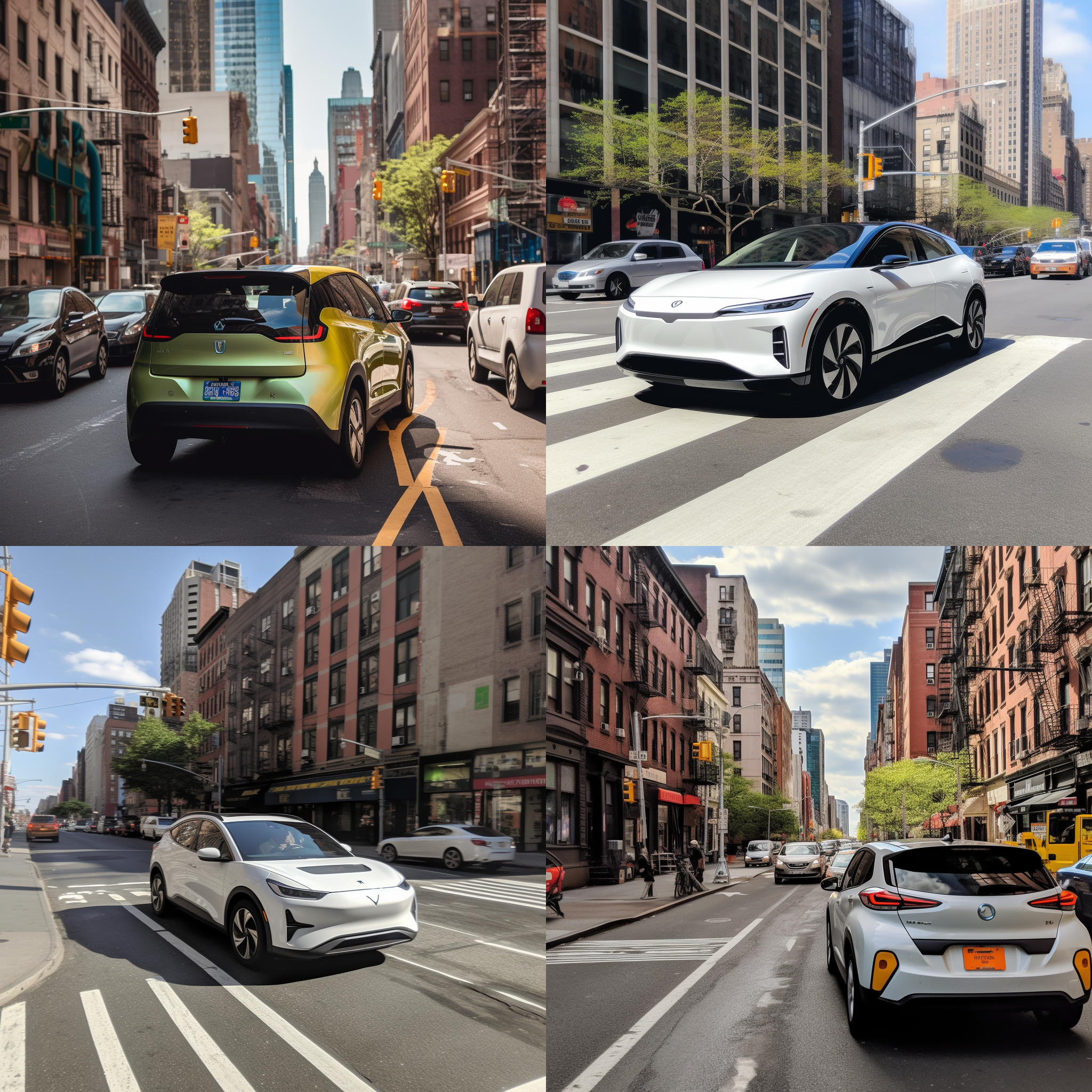Electric vehicles have surged in popularity lately, emerging as a greener, more efficient option compared to traditional gasoline-powered cars. An electric vehicle operates on electrical power from its energy source instead of relying on fuel combustion within an internal combustion engine.
Electric cars usually use batteries or regenerative braking systems for their energy source and can be powered by renewable sources of energy like solar or wind power.
On the other hand, gas cars are those powered by gasoline or diesel through an internal combustion engine, which works by mixing air with fuel and then compressing it inside cylinders before igniting it with spark plugs. Gasoline engines typically produce more power than electric motors but also emit harmful pollutants into the atmosphere.

Now let’s take a look at the advantages and disadvantages of each type of car when it comes to environmental impact.
Advantages & Disadvantages Of Each Type Of Car
Electric cars have a lot going for them, environmentally speaking. One of the biggest advantages is that electric vehicles (EVs) don’t use gasoline or diesel, meaning they produce no tailpipe emissions and are much quieter than gas-powered cars. Plus, EVs typically require less maintenance since there’s no need to change oil or spark plugs. As far as costs go, while an EV may cost more upfront, you could save money in the long run on fuel expenses due to their higher efficiency.
Gasoline-powered cars still dominate the automotive market but they’re not without environmental drawbacks. Gas engines emit greenhouse gases like carbon dioxide into the atmosphere when running, resulting in air pollution which contribute to global warming. They also require regular engine oil changes and other types of routine repairs and maintenance over time, resulting in more waste products being generated from these activities. And depending on where you live, you might pay higher prices for gasoline compared to electricity used to power an EV.
So when it comes down to making an eco-friendly car choice between electric vs gas vehicles – both come with pros & cons based on the situation at hand and your own personal needs & preferences. Ultimately, taking all these factors into consideration can help you make the best decision for yourself and for our planet!
Pollution & Carbon Emissions
It’s no secret that electric and gas cars differ drastically when it comes to their environmental impacts. The difference is so immense, in fact, that it almost feels like night and day! Electric cars emit zero emissions into the atmosphere while running on electricity – an abundant source of clean energy. On the other hand, gas-powered vehicles release large amounts of carbon dioxide, contributing significantly to climate change and pollution levels around the world.
But what about energy efficiency? When comparing electric cars to gas cars in terms of how efficiently they use fuel sources, there’s really no comparison. Electric cars are far more efficient than gasoline or diesel engines because they don’t require any additional energy for combustion; instead, all of the power generated by the motor is used directly to drive the wheels. As a result, electric vehicles tend to be cheaper to operate over time as well.
Lastly, let’s talk about cost: While electric cars may initially come with a higher sticker price than gas-powered vehicles due to technology advancements and battery costs associated with them, many governments offer incentives and tax credits which can make them much more affordable in the long run. Additionally, since electric car owners do not need to purchase fuel like those with traditional petrol-powered cars, overall operating costs may be lower too.
Availability and cost of fuel sources will have an impact on whether you decide to go for an electric or a gasoline vehicle – but whichever way you choose should ultimately depend on your needs and budget constraints as well as its environmental implications.
Availability And Cost Of Fuel Sources
It’s no secret that electric cars and gas cars have different fuel sources. When considering which type of car is the better choice for the environment, it’s important to consider both the availability and cost of these fuel sources.
When it comes to availability, electric cars require access to electricity while gas cars need gasoline or diesel. In most cases, electricity is more widely available than gasoline and diesel due to its general use throughout households and public spaces. This makes electric vehicles a much more accessible option when compared with gasoline-powered ones.
The cost of each fuel source varies depending on location, but generally speaking, electricity tends to be cheaper than gasoline or diesel in terms of overall long-term costs. The initial purchase price of an electric vehicle may seem high at first glance; however, over time you can save significantly by using electricity instead of fossil fuels as your primary source of power. Electric vehicles also tend to require less maintenance than their counterparts since they don’t rely on complex mechanical components such as engines and transmissions like traditional combustion engine vehicles do.
In addition, access to charging stations has become increasingly widespread in recent years thanks to advancements in battery technology and infrastructure investment from governments worldwide. This means there are now more options than ever before for drivers looking to charge up their cars quickly and conveniently while being environmentally conscious at the same time.
All things considered, when it comes to comparing electric versus gas-powered vehicles in terms of environmental impact, access and cost of fuel sources should play an important role in any decision making process. While both types of cars have pros and cons associated with them, ultimately it depends on individual needs and preferences when choosing between the two.
Battery Technology And Charging Stations
Electric cars are rapidly gaining popularity due to the fact that they produce fewer emissions than gas-powered vehicles. But when it comes to comparing electric and gas cars, one of the most important factors is battery technology and charging stations. Let’s take a closer look at this comparison:
| Electric | Gas |
|---|---|
| Battery Technology | Refueling Stations |
| Charging Station Availability | Fuel Type Options & Availability |
| Cost Per Charge/Refuel | Environmental Impact |
The technological advancements in electric vehicle batteries means that drivers can go further with each charge compared to refueling tanks for gasoline-powered vehicles. In addition, there has been an increase in availability of charging stations for electric vehicles across many countries making them more accessible than ever before. With regards to cost, although electricity costs vary from region to region, on average, recharging your EV takes less money per mile traveled than filling up a tank of gasoline would.
The environmental impact between the two types of fuels is also worth noting. Many studies have shown that electric vehicles significantly reduce air pollution when compared with conventional fossil fuel powered engines. Even though natural gas still emits some carbon dioxide into the atmosphere during combustion process, it’s much lower than burning petrol or diesel which makes it a better option as far as climate change is concerned.
Transition sentence: Looking beyond battery technology and fueling methods, safety regulations and comparisons must be taken into account when deciding whether an electric car or a gas car is right for you and the environment..
Safety Regulations And Comparisons
When it comes to safety regulations, electric cars and gas cars generally share the same standards. The National Highway Traffic Safety Administration (NHTSA) has implemented several rules that apply to both types of vehicles in order to ensure occupant protection. Additionally, many states have imposed additional requirements for certain components, such as airbags or seatbelt systems.
In terms of safety comparisons between electric cars and gas-powered vehicles, there is not a clear winner. Both options are considered safe when used properly by an attentive driver. However, some believe that electric cars may be safer because they typically don’t produce toxic exhaust fumes like their gasoline counterparts do. This makes them ideal for areas with high levels of air pollution.
Overall, the environmental impact of these two vehicle types should also be taken into account when determining which option is better for the environment. Electric cars require less energy to operate than gas-powered vehicles due to their efficient motors and lack of emissions from combustion engines. On the other hand, gas-powered vehicles can still offer superior performance compared to electric models if fuel efficiency is desired over reduced emissions. Next up: let’s discuss maintenance costs!
Maintenance Costs
When it comes to deciding between electric cars and gas cars, the choice of which one is better for the environment can be complicated. While safety regulations are important considerations in this decision, another factor that needs to be taken into account when comparing these two types of vehicles is maintenance costs.
Of course, both electric and gas cars need regular servicing and repairs, but there are some distinct differences between them in terms of cost comparison. Generally speaking, service costs for an electric car tend to be higher than those for a gasoline-powered vehicle. This includes repair costs as well as parts costs – although it should be noted that certain electric vehicle components may have longer lifespans than their petroleum counterparts.
The good news is that while electric car owners might see slightly higher upfront expenses compared with traditional fuel users, they could save significantly over time due to increased efficiency levels and lower running costs. In other words, if you’re looking for long-term savings on your car ownership experience then an EV could provide just what you’re after!
With all this in mind, the next step in making the right environmental choice is understanding how each type of vehicle performs when put through its paces…
Performance Capabilities
When it comes to performance capabilities, electric and gas cars each have their own strengths. Electric cars are known for their smooth acceleration and excellent fuel economy. They can travel up to 300 miles on a single charge, depending on the model of car. On top of that, they don’t require regular maintenance like oil changes or spark plug replacements.
Gas cars, meanwhile, tend to offer higher acceleration rates than electric vehicles due to their internal combustion engines. This makes them better suited for high-speed driving conditions. Additionally, they usually cost less upfront and come with more customization options such as engine modifications or larger tires. However, they do require frequent trips to the pump in order to stay fueled up and generate more emissions.
Overall, both types of vehicle have distinct advantages when it comes to performance capabilities. Depending on an individual’s needs and budget, one type may be preferable over another when considering environmental impact. With this in mind, let’s take a closer look at the impact these vehicles have on local communities around the world.
Impact On Local Communities
It is undeniable that electric cars present numerous advantages over gas-powered vehicles, particularly when it comes to the environment. However, there are still many people who question whether electric car usage has a positive impact on local communities as compared to traditional gasoline-driven automobiles. To answer this question and explore the topic further, we must take into account both the environmental effects of emissions from gas cars and the economic cost of fuel in order to determine which option is better for local communities.
When comparing electric cars and gas-powered vehicles with regards to their contribution to air pollution, it becomes clear that electric cars have significantly fewer emissions than their counterparts; this makes them more environmentally friendly. Additionally, due to advances in technology, electricity production is becoming cleaner and cheaper every year, making electric cars even more attractive options for those looking to reduce their carbon footprints. Furthermore, government policies regarding transportation are increasingly favoring electric vehicle use as an alternative way to cut down on greenhouse gases.
On the other hand, when considering cost factors such as fuel prices, it can be argued that purchasing an electric car may not always make sense financially depending on where one lives or drives. For instance, if you live in a rural area where charging stations are few and far between or if your commute involves long distances on highways at high speeds then purchasing a battery powered vehicle might become quite costly in terms of energy consumption per mile traveled relative to using a conventional automobile fueled by petrol or diesel.
Overall, while electric cars clearly offer superior environmental benefits over gasoline-powered vehicles due to reduced emissions and lower costs associated with renewable energy sources like solar power or wind turbines, they may not always be feasible choices for everyone’s needs – especially those living in remote areas without access to reliable charging infrastructure or who need longer range capabilities beyond what current EV models offer today. As we look ahead towards future implications for sustainability and climate change mitigation strategies however, it will become increasingly important for all consumers – regardless of location –to consider transitioning away from gas engines towards electrified solutions whenever possible in order to benefit our planet’s health now and going forward. With this knowledge in mind let us turn our focus now onto understanding the long-term implications for the environment of utilizing these two types of transport technologies.
Long-Term Implications For The Environment
When considering the long-term implications for the environment, electric and gas cars both have their own impacts to consider. Electric vehicles are well known for having lower carbon emissions compared to traditional gasoline powered cars. This is due to electricity being a much cleaner source of energy than burning fossil fuels. In addition, electric vehicles require less energy consumption as they do not need frequent refueling like gasoline engines do.
On the other hand, gas cars emit pollutants such as nitrogen dioxide and particulate matter into the air that can contribute to poor air quality in cities and cause respiratory health issues for individuals living nearby. Gasoline also produces more greenhouse gases than electricity does when burned, contributing significantly to global climate change over time if left unchecked.
Ultimately, although electric vehicles appear to be beneficial from an environmental standpoint at first glance, there needs to be further consideration of how these vehicles will affect our resources in the long run before making a definitive judgement on which type of vehicle is better for the environment overall. With proper regulation and implementation of renewable sources of energy for charging EVs along with improvements made in efficiency standards for gasoline cars, it may be possible to eventually reach a compromise between the two types of automobiles that offers an optimal balance between environmental protection and economic practicality.
Frequently Asked Questions
How Long Do Electric Car Batteries Last For?
When it comes to electric cars, the battery life is a major deciding factor for many potential buyers. With the world becoming more and more aware of environmental impact, being able to drive an eco-friendly vehicle without having to worry about constantly replacing batteries is essential. As an environmental automotive analyst, I can confidently say that electric car batteries have come a long way in terms of longevity and maintenance needs.
Electric car battery lifespan varies depending on factors such as usage amount, charging habits, temperature extremes, and quality of care. On average though, most modern electric car batteries last between 8-10 years with proper maintenance – making them incredibly reliable compared to their gas counterparts. It’s also worth noting that keeping up with regular checkups on your electric car’s battery will help extend its life even further. This includes monitoring charge levels, taking extra precautions in extreme temperatures, and ensuring all connections are secure from corrosion or damage over time.
Overall, if you’re looking for a practical solution for eco-friendly transportation that requires minimal upkeep than investing in an electric car is definitely one way to go. Its lasting power makes it ideal for those seeking something both efficient and cost effective — two things everyone should be mindful of when considering their next vehicle purchase!
What Is The Range Of An Electric Car?
When it comes to electric cars, many people wonder what the range of an electric car is. As an environmental automotive analyst, I have studied this question to help you decide if electric cars are a good choice for your lifestyle or not.
The range of an electric car depends on several factors such as:
- The capacity and condition of its battery;
- The type and weight of the vehicle;
- Driving conditions; and
- And whether extra features like air conditioning are used.
Generally speaking, most electric vehicles can travel between 80-125 miles per charge. Some higher end models can even get up to 300 miles per charge! Electric car battery life also varies depending on how well they’re maintained. To maximize their lifespan, it’s important to remember that temperature affects them – so don’t leave them out in extreme heat or cold for long periods of time. Additionally, make sure to keep your electric car charger clean from dust and other debris because it will reduce performance over time.
Overall, when considering the range of an electric car, there are many variables at play that affect mileage and battery life. However, with proper maintenance and care, an electric car could be a viable option for those looking for sustainable transportation options without compromising convenience.
How Does The Cost Of Owning An Electric Car Compare To A Gas Car?
Owning an electric car versus a gas car is something to consider when looking for environmentally friendly options. It can be difficult to determine which one is the better option, and it largely depends on your budget and needs. Let’s take a look at how the cost of owning an electric car compares to that of a gas car.
When considering costs associated with electric cars vs gas cars, many factors come into play. These include purchasing price, maintenance costs, fuel efficiency, electricity costs and more. Generally speaking, electric cars tend to be more expensive than their gasoline counterparts due to higher production costs. However, they also tend to require less frequent servicing over time so this should offset some of the upfront expenses. Additionally, they are much more fuel efficient meaning you will save money in the long run on electricity compared to gasoline costs.
It’s important to remember that there are other financial considerations beyond just purchase price and fuel efficiency when comparing these two types of vehicles. For example, most states offer incentives or tax credits for those who choose to buy an electric vehicle – something not typically available for traditional gasoline-powered cars. Furthermore insurance rates may vary between both models depending on where you live as well as if any safety features are included in the model you select.
Overall when determining whether an electric or gas car is right for you, it’s essential that you factor in all potential costs associated with ownership including purchase price, ongoing fees such as registration fees and taxes and fuel costs over time – since all these add up quickly! Here are five key points to keep in mind:
- Electric Cars often have higher initial purchase prices but lower operating/fueling costs over time
- Maintenance requirements can be lower for EVs compared to gasoline fueled vehicles
- Many states offer incentives or tax credits for EV owners
- Insurance rates may vary based on location & safety features
- Fuel efficiency impacts overall cost savings significantly
As an environmental automotive analyst I would recommend researching all potential savings before committing to either type of car – doing so could help ensure that you make the best decision possible regarding cost while still obtaining the desired emissions benefits from your choice of vehicle.
Are Electric Cars More Reliable Than Gas Cars?
When it comes to electric cars vs. gas cars, the reliability of each is a key factor in determining which is the better choice for the environment. Therefore, when comparing electric and gas cars, it’s important to look at their respective levels of reliability.
As an environmental automotive analyst, I find that electric cars are generally more reliable than gas cars due to their simpler design structure and fewer moving parts. Additionally, electric engines have less wear-and-tear on them over time compared to combustion engine counterparts. Some notable benefits include:
- No need for oil changes or routine engine maintenance
- Lower chance of breakdowns due to fewer possible points of failure
- Longer lifespan as there are no spark plugs or other mechanical components that can fail down the road
That being said, not all electric vehicles offer the same level of reliability; some models may be prone to battery degradation after years of use. In order to ensure you’re getting a car with high quality build materials and long lasting power sources, always do your research before investing in any type of vehicle, whether it be electric or gasoline powered. Researching reviews from reputable sites like Consumer Reports and Edmunds will help give you a good idea about how reliable different makes and models are overall.
In short, when considering which type of car best fits your needs while also taking into account its impact on the environment – consider looking at both types relative levels of reliability. Doing so might just help make sure that you get the most value out of your purchase in terms of longevity and dependability.
What Are The Environmental Impacts Of Manufacturing Electric Cars?
When it comes to electric car manufacturing, one of the most important questions is what are the environmental impacts? While electric cars have been heralded as a cleaner, greener option compared to gas-powered vehicles, their production also has an impact on the environment. As an environmental automotive analyst, I believe that understanding these impacts is essential for making informed decisions about electric car ownership.
Electric car production requires energy and resources like those required in traditional vehicle manufacturing processes. The main source of emissions during this process are from burning fossil fuels – primarily coal – to generate electricity used in production facilities. This means that electric car production generates greenhouse gases, which can lead to global warming if released into the atmosphere. Additionally, mining materials such as lithium and cobalt for batteries involves extensive land use changes and potential water contamination issues due to runoff from mining operations.
However, there are some benefits associated with electric car manufacturing when looking at its overall effect on the environment. For example, research shows that once they’re up and running, electric cars produce fewer emissions than gasoline-powered vehicles over their lifetime because they don’t need fuel or oil changes. Electric cars also require less maintenance than their gas counterparts since they have fewer moving parts and no need for spark plugs or air filters. Furthermore, many manufacturers now offer renewable energy options for charging their battery packs so that owners can reduce their carbon footprints even further by opting for clean sources of energy instead of relying on fossil fuels to power their vehicles.
Taking all of this information into account, it’s clear that while electric cars may not be completely emission free – thanks in part to the emissions created through the manufacturing process –they still offer a much more sustainable choice than gas-fueled vehicles when it comes reducing your environmental footprint. With advances in renewable energy technologies providing viable alternatives for powering our transportation needs going forward into the future, investing in an electric car could be a great way to ensure you’re doing your part towards protecting our planet for generations to come.
Conclusion
In conclusion, electric cars and gas cars are both great options for the environment depending on your needs. Electric cars come with many advantages such as long-lasting batteries, reliable performance, low cost of ownership, and zero emissions driving. However, it’s important to consider the environmental costs associated with manufacturing electric vehicles compared to traditional gasoline powered engines.
Electric cars have a lot going for them: they’re more efficient and environmentally friendly than their gas counterparts. But when deciding which is best for you, there are some key factors to keep in mind. Range, battery life and cost of ownership all need to be weighed up against each other before making your decision. And if you’re looking for an eco-friendly solution that won’t break the bank – then gas may just be the way forward!
Ultimately, it comes down to personal choice but one thing is certain; like two sides of a coin, electric cars and gas cars each offer unique benefits that make them worthy contenders in the quest for sustainable transportation solutions. As Mark Twain said “buy land—they’re not making any more of it”. So why not use our resources wisely by choosing an option that will help protect our planet?









